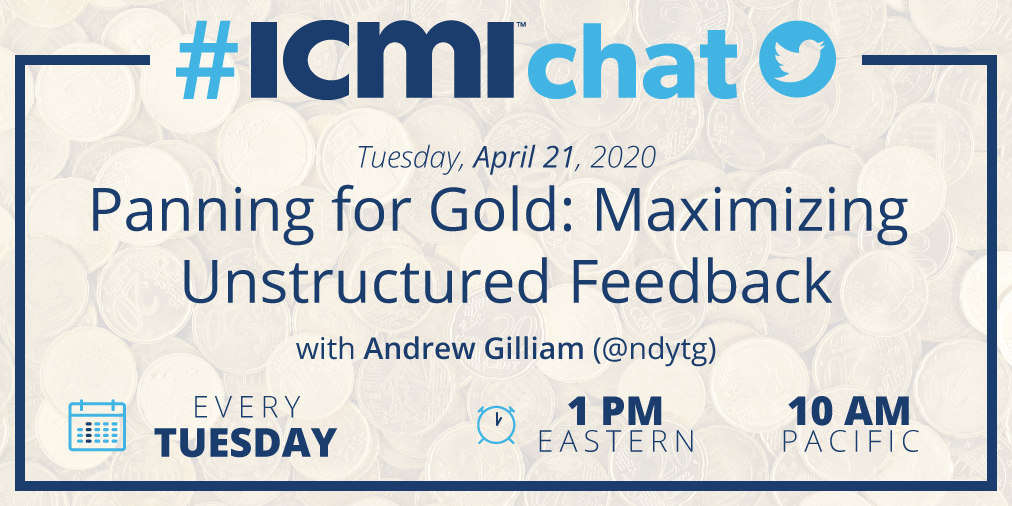By
The Editors
|
Date Published: April 15, 2020 - Last Updated September 08, 2020
|
Comments

When it comes to customer service, effective training is imperative to delivering remarkable experiences. Agents can't be there for your customers if they're not well prepared themselves. Training is also a key driver of strategic metrics such as first contact resolution, agent engagement, and cost to serve.
With this in mind, our special co-host this week, Rebecca Gibson, asked the #ICMIchat community about their approach to training. Rebecca is an experienced trainer and ICMI Business Associate herself, and she's especially passionate about helping employees be successful in their roles and lead their organization.
This #ICMIchat is sponsored by ICMI's Contact Center Training. ICMI offers highly interactive, consultative-based call center training and education for all levels and roles. Our content focuses on critical areas such as process improvement, increasing employee engagement, improving service levels, optimizing operations, and raising the overall value of the center.
Join us next week on Twitter at 1 p.m. Eastern for Panning for Gold: Maximizing Unstructured Feedback. A preview of the questions follows this article.
Training for the Future
Contact center agents get plenty of training, but not all training hits the mark for what agents need right now. While agents need to know your organization's policies and procedures, our community notes that it's equally important they have an understanding of the intent and reasoning behind policy decisions. When front-line employees understand the company's strategic goals, they can implement supporting policies more effectively.
Modern contact center agents need more training that supports decision-making. (And they need managers that allow it.) They have enough YES/NO trainings. They need more MAYBE and HERE'S HOW trainings.
Training on culture and service experience expectations. Teach to use resources. Spend time on applying CX expectations in situations they are likely to come across. Don't just focus on system and policy. While important, we likely spend too much time here.
Setting the Agenda
Developing good content is only half the training battle. First, we need a firm grasp on what training is required, how the audience is expected to implement it, and how success will be measured. It's easy to accidentally develop really good training that doesn't apply to trainees' work. Multiple stakeholders should be consulted and perspectives considered when deciding on a training curriculum.
I have seen the best person to develop the agent training is the team leads. They know what agents need to know to solve problems. The leads also have respect from the agents because they are in the trenches with them, so the respect is there.
Training Department (if applicable) or Senior Leadership team and should include feedback from the agents, frontline staff, customer feedback data trends, key internal partners and stakeholders, HR (could provide feedback from exit interviews or other topics).
Training for Interesting Times
There's no doubt among our community that extraordinary times call for specialized training. It's critical to consider how your workforce's needs might have shifted in response to the pandemic and shelter-in-place mandates.
Delivery methods. Online, elearning, virtual, remote. Training quality must be impeccable. Little to no margin for error in WFH environment.
Autonomy - the honeymoon for many agents who thought working from home would be a dream. They’re realising that remote working and isolation can also bring with it procrastination. Autonomy is a skill and doesn’t come naturally to everyone.
Who and When to Train
If training efforts aren't need-based, trainees' could become bored or feel as if their time is not respected. Further, training too little can miss opportunities for success, while training too much might unreasonably strain precious resources. Just as agents need the right training, it must be delivered at the right time and in the proper format to be impactful.
How might leaders know when and what type of training is needed?
- When agents ask for it
- By studying which agent behaviors cause repeat contacts
- By studying the most successful interactions w customers to see how to duplicate those
- When software changes
In this environment I think micro-learning is key. It’s more timely and easy to consume. It’s relevant and easier to retain long term. Applying game mechanics to the learning can also make it more engaging and helps attract wider learning styles.
Maximizing Learning Experiences
Training cannot be thought of as a "set-and-forget" activity. Leadership plays a vital role in helping employees to maximize what they're learning, mainly after the course is over. Our co-host Rebecca likes to set leaders up for success by sharing discussion points and activities that support their training investment. Others noted that it's essential for training to be interconnected with other measures and rewards. Even the dreaded deadline is sometimes helpful in holding learners accountable for their commitments.
What can leaders to do help their employees make the most out of trainings?
- DO NOT make it optional
- Tie it to their performance appraisals
- Create a personalised learning a plan for each agent
- Help them make time for learning
- Reiterate the importance
Design your content so you engage ALL learning styles and be sure to reinforce the learning with ongoing quality management and coaching.
Align the training to the agent's quality assurance performance expectation, monitor the agent's work to reinforce the new training behaviors, provide constructive performance feedback to agents, and celebrate/award agents displaying the new training behaviors.
The book Drive, by Daniel Pink, suggests what keeps people motivated: Mastery, autonomy, and purpose. Tying these in with training, and a solid understanding of the big picture, helps our agents stay engaged.
Did It Work?
As with any other initiative, it's essential to have a clear idea of how you'll evaluate success. While some leaders rely on their intuition, the benefits of training can be quantified by changes in metrics or KPIs. Measuring tangible outcomes of training also helps to justify the expense.
I would say use the data. After the training the first call resolution should increase.
Approved training should address: 1. What problem are we trying to solve? 2. How does the training curriculum help solve that problem? 3. Pre-training current KPI or goal result? 4. Post-training desired KPI or goal result? 5. Collect data & monitor results
Historically I relied a bit too much on my gut. Was their AHT coming down to a reasonable level? Was quality improving? Did the volume of supervisor questions decrease?
Engaging Virtual Classrooms
Keeping the attention of trainees in person is hard enough. It takes special care and design to captivate a virtual audience for long periods. Even if the core messages of your training remain the same, delivery should be tailored to the audience and the environment in which training takes place.
If you don't know how to design and deliver virtual content, yes. How do you do small group activities, monitor engagement (e.g. eye contact, questions, etc.), "showing" on computer for someone who is stuck/behind, etc. These can all be overcome but need a plan.
Regardless of where learners are the training needs to be memorable. In person doesn’t stop knowledge falling down that imaginary hole that sits at the doorway to the classroom. Help learners retain knowledge by delivering the unexpected.
Training Formats
When it comes to designing training activities, our community suggested using collaboration as an engagement tool. Students can learn just as much from each others' experience as they can from a textbook. Finding the right pace and tempo is also crucial for keeping your audience awake.
Time bound learnings are better as it gives the learner some sense of urgency. I'm also a huge fan of tests. A really well designed test at the end of the training can give the learner a feeling of accomplishment.
I think the gold standard is bringing everyone together to leverage collaboration during training. As much as possible.
#ICMIchat April 21, 2020
Panning For Gold: Maximizing Unstructured Feedback

Q1: Have you ever received helpful, unexpected, or surprising feedback as part of another customer interaction?
Q2: As a customer, do you withhold feedback if you don’t think the agent you’re speaking to is empowered to act on it?
Q3: What makes it challenging to fully utilize feedback received by front-line employees?
Q4: What is the best way for front-line employees to capture spontaneous customer feedback?
Q5: As a leader, have you ever experienced difficulty organizing and quantifying feedback that comes up through front-line employees?
Q6: What is the best way for team leaders and managers to organize and prioritize random feedback we receive?
Q7: How can we encourage customers and front-line employees to continue sharing impromptu feedback?
Q8: What technologies have the greatest promise for capturing and organizing unstructured feedback?